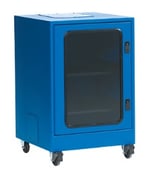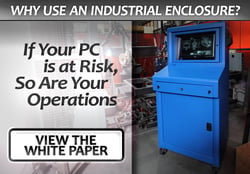As desktop 3D printers become commonplace, companies are realizing that simply purchasing the latest and greatest 3D printer is only half the battle.
Many factors during the 3D printing process must be met, in order to achieve the best product. 3D printers are an innovative and exciting product to use, but there are some drawbacks to using a 3D printer. Users of 3D printers complain about the fumes that the plastic emits, the heat that the printer generates, and the fact that it produces a loud noise when printing an object.
Environmentally sealed industrial enclosures can help alleviate some issues that arise when using a 3D Printer.
Three 3D Printer Negatives
 1. Sound
1. Sound
3D printers require a substantial amount of time to create a coffee mug or small plastic horse, and can be louder than the average office copier/printer. Depending on the location of the 3D printer, it may become an annoyance to employees. No one wants to sit and listen to a loud printer for hours at a time. Sealed industrial enclosures can help dampen the sound during the printing process. Most companies do not have the luxury of a room that is primarily used for a printer. By enclosing the printer, the sound can be minimized and employees can return to concentrating on important tasks.
2. Heat
Thermal management is always important when discussing printer enclosures.  Michael Hackney, 3D Printing blog, discusses how heating and cooling are both vital considerations to 3D printing, “A heated build surface… is an optional component that can help minimize part warping and improving filament adherence to the build surface.” He continues with the importance of cooling, “Two different types of fans are useful. The first is to cool the barrel, the tube above the heated nozzle that the filament passes through, and the second is to cool parts as they print to minimize distortion and warping. Proper use of these fans is dependent on the print material and the geometry of the part.” The overall temperature of the room and how often the printer will be in use must be considered when deciding on the correct heating and cooling system. For an accurate thermal management recommendation, download a cooling requirement worksheet.
Michael Hackney, 3D Printing blog, discusses how heating and cooling are both vital considerations to 3D printing, “A heated build surface… is an optional component that can help minimize part warping and improving filament adherence to the build surface.” He continues with the importance of cooling, “Two different types of fans are useful. The first is to cool the barrel, the tube above the heated nozzle that the filament passes through, and the second is to cool parts as they print to minimize distortion and warping. Proper use of these fans is dependent on the print material and the geometry of the part.” The overall temperature of the room and how often the printer will be in use must be considered when deciding on the correct heating and cooling system. For an accurate thermal management recommendation, download a cooling requirement worksheet.
3. Fumes/Air Emissions
It is best to store the 3D printer in a room with superb ventilation, but if that is not a viable option, an industrial enclosure can help solve the problem. The fumes given off by the plastics can be very overwhelming. By enclosing the 3D printer, the fumes can be exhausted out of the room via building ducts. Lyndsey Gilpin, from Tech Republic, explains that the air can be unhealthy, “The emissions from desktop 3D printers are similar to burning a cigarette or cooking on a gas or electric stove… While heating the plastic and printing small figures, the machines using PLA filament emitted 20 billion ultrafine particles per minute, and the ABS emitted up to 200 billion particles per minute. These particles can settle in the lungs or the bloodstream and pose health risk, especially for those with asthma.” Sam Shead, also from Tech Republic, reiterates how 3D printers cause an abundance of harmful particles, “The significant number of particles emitted as a result of 3D printing can be hazardous to humans when they are inhaled… When ultrafine particles (UFPs) are inhaled, they can end up in the lungs and even the brain.” A properly sealed enclosure can greatly cut down on the fumes and emissions produced by the printer.
With rugged, quality-built industrial enclosures, a company can help minimize all three of these concerns. Heidi Milkert, from 3dprint.com, explains, “Enclosures are a fairly important option, especially if you want to avoid some of the major issues commonly seen within the print process. With that said, even some of the better, higher quality machines out there lack an enclosure, making me wonder just how much better they could be if an enclosure would have be added.” Milkert adds, “[Enclosures] reduce or eliminate problems such as warping, curling, cracking, noise, heat loss, and fume emission."
HAVE QUESTIONS? LET US KNOW HOW WE CAN BEST ASSIST YOU! CONTACT AN 'ITSENCLOSURES EXPERT' AT 1-800-423-9911 -OR- SEND US AN EMAIL: INFO@ITSENCLOSURES.COM




